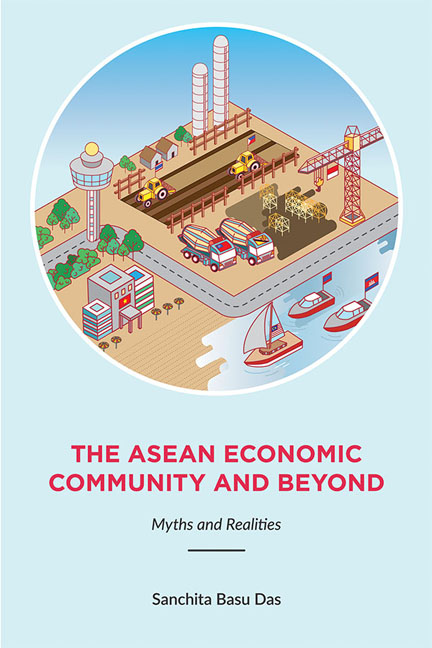Book contents
- Frontmatter
- Dedication
- Contents
- Foreword
- Acknowledgements
- Abbreviations
- 1 Introduction: The ASEAN Economic Community and Beyond
- I THE ASEAN ECONOMIC COMMUNITY (AEC)
- 2 The ASEAN Economic Community: An Economic and Strategic Project
- 3 Can the ASEAN Economic Community Be Achieved by 2015?
- 4 Goods to Flow Slow and Steady within the ASEAN Economic Community
- 5 The Limited Impact of the ASEAN Economic Community on Skilled Labour Migration
- 6 Five Facts About the ASEAN Economic Community
- 7 Growing Economic Diplomacy in ASEAN: Opportunities and Threats
- 8 Towards ASEAN Economic Community 2025!
- II BEYOND THE ASEAN ECONOMIC COMMUNITY
- III AN ASEAN PERSPECTIVE OF REGIONAL CONNECTIVITY
- Appendix: Summary of the Trans-pacific Partnership Agreement
- Index
- About the Author
3 - Can the ASEAN Economic Community Be Achieved by 2015?
from I - THE ASEAN ECONOMIC COMMUNITY (AEC)
Published online by Cambridge University Press: 19 May 2017
- Frontmatter
- Dedication
- Contents
- Foreword
- Acknowledgements
- Abbreviations
- 1 Introduction: The ASEAN Economic Community and Beyond
- I THE ASEAN ECONOMIC COMMUNITY (AEC)
- 2 The ASEAN Economic Community: An Economic and Strategic Project
- 3 Can the ASEAN Economic Community Be Achieved by 2015?
- 4 Goods to Flow Slow and Steady within the ASEAN Economic Community
- 5 The Limited Impact of the ASEAN Economic Community on Skilled Labour Migration
- 6 Five Facts About the ASEAN Economic Community
- 7 Growing Economic Diplomacy in ASEAN: Opportunities and Threats
- 8 Towards ASEAN Economic Community 2025!
- II BEYOND THE ASEAN ECONOMIC COMMUNITY
- III AN ASEAN PERSPECTIVE OF REGIONAL CONNECTIVITY
- Appendix: Summary of the Trans-pacific Partnership Agreement
- Index
- About the Author
Summary
ASEAN Leaders have repeatedly shown interest to achieve an ASEAN Economic Community (AEC) by 2015. But it is highly unlikely that ASEAN can refer itself as an effective “Economic Community”, i.e. a community where ASEAN businesses and citizens are able to benefit in terms of lower costs and better job opportunities. Although tariffs have been reduced and agreement like Trade in Goods is in place, there are many non-tariff barriers in the region. The trade facilitation measure of the National Single Window is said to suffer from lack of coordination between agencies or lack of appropriate human resource for most of the member countries. ASEAN is yet to reduce transportation and logistics costs between and within member economies. Despite endorsing the ASEAN Comprehensive Investment Agreement (ACIA) in 2012, ASEAN countries lack domestic reforms and this limits the FDI flows in the region. ASEAN countries continue to suffer from the issue of development divide. The business community, as one of the final beneficiaries, is yet to have full awareness on AEC matters. Despite all these issues, ASEAN economic integration efforts seem difficult to derail. As time is running fast, the ASEAN countries, are trying earnestly to implement the “core” elements of integration by 2015. These are the measures that are expected to have high impact in the region. The region is also trying to play a role of “bridge builder” between countries in the greater scope of Asia. While some of the aspirations of ASEAN economic cooperation would be met by end-2015, rest will be carried forward beyond that.
INTRODUCTION
ASEAN Leaders have repeatedly shown that they do wish to achieve an ASEAN Economic Community (AEC) by 2015. They adopted the ASEAN Charter and the AEC Blueprint in 2007 and approved the Master Plan on ASEAN Connectivity (MPAC) in 2010. But be that as it may, it is highly unlikely that ASEAN can refer itself as an effective “Economic Community”, i.e., a community where ASEAN businesses and citizens are able to benefit in terms of lower costs and better job opportunities. What may be a better approach is to see the AEC as an ongoing process for which all the right foundations have been laid.
This paper sees the glass as half full, and discusses ASEAN's achievements as well as the challenges the grouping has to face where achieving the AEC is concerned.
- Type
- Chapter
- Information
- The ASEAN Economic Community and BeyondMyths and Realities, pp. 23 - 33Publisher: ISEAS–Yusof Ishak InstitutePrint publication year: 2015



